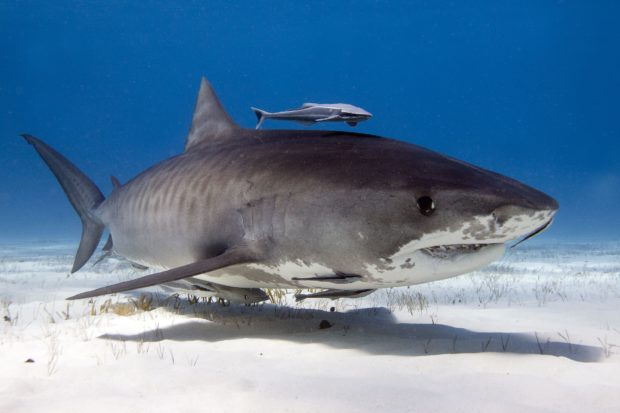
Eleven U.S. states have joined the crusade to stop the cruel practice of hacking the fins off the sharks, often while they’re still alive, and throwing the bleeding, injured animals back into the water to slowly die. Photo by Vanessa Mignon
In the midst of Shark Week, there’s some reason for hope for these much-battered species. In Texas, a law banning the sale of shark fins takes effect today, and that’s especially significant because Texas is the first of the Gulf Coast states to adopt a shark-protection policy with teeth that would make a Great White envious.
Just prior to the implementation of this law in the biggest state in the lower 48, the smallest of our states, Rhode Island, did its part – enacting its own ban on the sale of fins. Now 11 states have these policies – collectively representing the heart of the movement to stop the cruel practice of hacking the fins off the sharks, often while they’re still alive, and throwing the bleeding, injured animals back into the water to languish and die.
But we’re not satisfied, and those actions, while critical, are not enough. We are taking the case to other jurisdictions. In New Jersey, a shark fin ban has just passed the state senate, and a bill is now under consideration in Pennsylvania.
Outside the United States, Humane Society International, our international arm, continues to advocate for greater protection for vulnerable shark species at key international conventions, and will press forward with ongoing public awareness campaigns in China and other parts of Asia to reduce demand for shark fins. Shark fins are considered a delicacy in Asia where they are used mostly in shark fin soup to showcase one’s wealth and honor one’s guests. A bowl of shark fin soup can cost as much as $100, which provides plenty of incentive for profiteers to engage in finning.
All of these domestic and foreign actions are positioning us for success at the national level – reminding our federal government that it must be a leader on this animal welfare, conservation, and economic development issue (as I write in The Humane Economy, there is a booming ecotourism industry built around shark diving and watching, and coastal nations are generating tens of millions of dollars in revenues by keeping sharks alive). Earlier this week, the Obama administration announced a final rule to implement the Shark Conservation Act of 2010 – which prohibits any person from removing the fins of a shark at sea, possessing detached fins on board a fishing vessel, transferring detached fins between vessels at sea, or landing a shark without its fins naturally attached anywhere along the U.S. coastline. This act closes several loopholes and fortifies the ban on shark finning in U.S. waters.
In Congress, U.S. Senators Cory Booker, D-NJ, and Shelley Moore Capito, R-WV, and U.S. Reps. Gregorio Kilili Camacho Sablan, D-Northern Mariana Islands, and Ed Royce, R-Calif., along with a bipartisan group of original cosponsors, have introduced the Shark Fin Trade Elimination Act that would largely prohibit the shark fin trade, including imports into and exports from the United States, transport in interstate commerce, and sales.
The popularity of Shark Week demonstrates how deeply fascinated we are with these marine animals. But fascination isn’t sufficient to turn around the problems. We have to be active protectors of sharks. It is estimated that as many as 100 million sharks are killed each year to supply the global market for shark products, including upwards of 73 million for their fins alone. The United States is the largest market for shark fins outside Asia and a top shark-catching country.
We’re excited about the prospects of success at the state, federal, and international levels, and we need your help. Sharks are in crisis, and we’re treating the problem as dire and urgent. Sharks have been on Earth for more than 400 million years. We don’t want to be the generation that liquidated them, caused such cruelty, and removed a keystone species from our ocean ecosystems.
The post Texas law banning finning goes into effect in the heat of Shark Week appeared first on A Humane Nation.
Related Stories
- Breaking news: Florida black bears get a 2016 stay of execution
- Trophy hunters should leave Florida’s bears alone
- One year after Cecil’s killing, time to take aim at trophy hunting
Enviroshop is maintained by dedicated NetSys Interactive Inc. owners & employees who generously contribute their time to maintenance & editing, web design, custom programming, & website hosting for Enviroshop.
